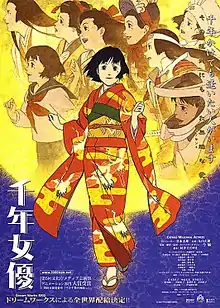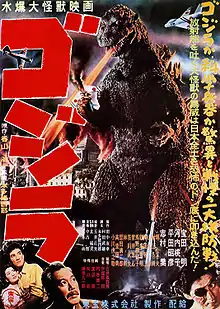Millennium Actress
Millennium Actress (千年女優, Sennen Joyū) is a 2001 Japanese animated drama film co-written and directed by Satoshi Kon and produced by Madhouse. Loosely based on the lives of actresses Setsuko Hara and Hideko Takamine,[3] it tells the story of two documentary filmmakers investigating the life of a retired acting legend. As she tells them the story of her life, the difference between reality and cinema becomes blurred.[4]
| Millennium Actress | |
|---|---|
 Theatrical release poster | |
| Directed by | Satoshi Kon |
| Produced by | Taro Maki |
| Screenplay by |
|
| Story by | Satoshi Kon |
| Starring | |
| Music by | Susumu Hirasawa |
| Cinematography | Hisao Shirai |
| Edited by | Satoshi Terauchi |
Production company | |
| Distributed by | KlockWorx |
Release date |
|
Running time | 87 minutes |
| Country | Japan |
| Language | Japanese |
| Budget | $1.2 million[1] |
| Box office | $37,641 (US)[2] |
Plot

Ginei Studios, a prestigious but bankrupt film studio, goes out of business. Television interviewer Genya Tachibana and his cameraman Kyoji Ida prepare for a retrospective interview with Chiyoko Fujiwara, the studio's best known star, who thirty years prior retired from acting and became a recluse. When they meet, Tachibana gives Chiyoko a key he believes she lost at the studio, prompting her to reflect on her life.
As Chiyoko begins, the film becomes a surreal story within a story wherein events from Chiyoko's life are interwoven with scenes from films she has appeared in, while Tachibana and Ida appear within them as documentary filmmakers. As a teenager, she was given the key by an artist and political dissident opposing the Sino-Japanese War. She helped him escape from the authorities and after his departure, decided to become a film actress in the hope that he would recognize and find her. Her quest continues for decades and Chiyoko becomes famous, acting in films ranging from jidaigeki to kaiju. Despite not hearing from the mysterious artist, she never loses hope.
Chiyoko loses the key one day during filming and resigns to marrying Junichi Ōtaki, a director at the studio. Years later, Chiyoko finds the key hidden in their home and confronts her husband about it; former lead actress Eiko Shimao reveals that she stole it out of jealousy and gave it to Junichi. One day, the former military policeman who had been pursuing the artist comes to Chiyoko to atone for his sins during the war, and gives her a letter from the artist. He tells Tachibana, who was working as a studio assistant at the time, that the artist was tortured and killed after his arrest. Though she does not receive this information, Chiyoko abandons her search for the artist, accepting that she is no longer the girl the artist once knew.
In the present, an earthquake strikes during the interview, upsetting Chiyoko's fragile health. On her hospital deathbed she reflects on her life, telling Tachibana that despite never seeing the man again, she realized that the search for him was what she loved most.
Cast
| Character | Japanese | English (Village Productions/Manga UK, 2005) | English (VSI/Eleven Arts, 2019) |
|---|---|---|---|
| Chiyoko Fujiwara (藤原 千代子, Fujiwara Chiyoko) | Miyoko Shōji (70s) Mami Koyama (20s-40s) Fumiko Orikasa (10s-20s) | Regina Reagan | Cindy Robinson (70s) Erin Yvette (20-40s) Abby Trott (10s-20s) |
| Genya Tachibana (立花 源也, Tachibana Genya) | Shōzō Iizuka Masamichi Satō (Young) | John Vernon | Christopher Swindle |
| Kyōji Ida (井田 恭二, Ida Kyōji) | Masaya Onosaka | Stuart Milligan | Ben Diskin |
| Eiko Shimao (島尾 詠子, Shimao Eiko) | Shōko Tsuda | Jo Lee | Laura Post |
| Junichi Ōtaki (大滝 諄一, Ōtaki Junichi) | Hirotaka Suzuoki | Stephen Bent | Keith Silverstein |
| Mino (美濃) | Tomie Kataoka | Samantha Shaw | Mona Marshall |
| Chief Clerk (番頭, Bantō) | Takkō Ishimori | Unknown | Unknown |
| Ginei Managing Director (銀映専務, Ginei Senmu) | Kan Tokumaru | John Vernon | Jamieson Price |
| Chiyoko Fujiwara's Mother (藤原千代子の母, Fujiwara Chiyoko no Haha) | Hisako Kyōda | Felicity Duncan | Barbara Goodson |
| Man with Key (鍵の君, Kagi no Kimi) | Kōichi Yamadera | David Kitchen | Greg Chun |
| Man with Scar (傷の男, Kizu no Otoko) | Masane Tsukayama | Matt Devereaux | JP Karliak |
Production
Following the release of Satoshi Kon's previous film Perfect Blue, Kon considered adapting the Yasutaka Tsutsui novel Paprika (1993) into his next film. However, these plans were stalled when the distribution company for Perfect Blue, Rex Entertainment, went bankrupt.[5] Millennium Actress had an estimated budget of $1.2 million.[1] The screenplay was written by Sadayuki Murai,[6] who used a seamless connection between illusion and reality to create a "Trompe-l'œil kind of film".[7] Millennium Actress is the first Satoshi Kon film to feature Susumu Hirasawa, whom Kon was a long-time fan of, as composer.[8]
When producing Millennium Actress, Kon created a unique combination of both his memories and his imagination, striving to make Millennium Actress and Perfect Blue two different interpretations of the same concept; a story told from two different perspectives. His intention was to have the two films as sister films. The film also presents various references to Japanese history, including the Edo period and Manchukuo, and gives it a nostalgic aesthetic. It is seen not as a sequence of events unfolding in real time, but rather in a retrospective, lighthearted point of view.
This is the last major animated film created with hand-inked cels, as most animated films at the time started to use digital ink-and-paint or computer animation.
Release
Theatrical anime distribution company Eleven Arts acquired the North American rights. The film was theatrically re-released in its original Japanese version on August 13, 2019 with a brand new English dub on August 19, 2019.[9] The movie was previously licensed by DreamWorks' arthouse and foreign movie publishing company Go Fish Pictures.
Box office
Commercially, the film performed modestly on its US release earning $18,732[10] on its opening weekend and $37,285 during its full three-week release. The film was shown almost exclusively in New York and Los Angeles and received a minimal advertising campaign from Go Fish Pictures, a division of DreamWorks SKG.
Critical reception
Millennium Actress was favorably received by critics, gaining a 93% "fresh" rating at Rotten Tomatoes.[11] Los Angeles Times critic Kenneth Turan said of the film "as a rumination on the place movies have in our personal and collective subconscious, Millennium Actress fascinatingly goes where films have not often gone before".[12] Kevin M. Williams of the Chicago Tribune gave the movie 4 stars and put his feelings for the film this way: "A piece of cinematic art. It’s modern day Japanese animation at its best […] It's animated, but it's human and will touch the soul of anyone who has loved deeply".[13] In February 2004, Cinefantastique listed the anime as one of the "10 Essential Animations", stating that the it "represents a new maturity for anime, one where the technical achievements of 40 years are finally put at the full service of an emotionally rich story."[14]
Awards
Millennium Actress received the Grand Prize in the Japan Agency of Cultural Affairs Media Arts Festival,[15] tying with Spirited Away. Additionally, it won the awards of Best Animation Film and Fantasia Ground-Breaker at the 2001 Fantasia Film Festival. It was awarded the Feature Film Award at the 8th Animation Kobe. The movie took home the prestigious Ofuji Noburo Award at the 2002 Mainichi Film Awards, and was honored with the Orient Express Award at the 2001 Festival de Cine de Sitges in Spain. The film was nominated for four Annie Awards in 2004, including Outstanding Direction and Writing. It was also promoted by its studio as a contender for the 2003 Academy Award for Best Animated Feature, but it was not nominated.
See also
References
- "Interview Satoshi Kon" (in French). Catsuka. October 18, 2006. Retrieved July 31, 2011.
- "Millennium Actress (2003)". Box Office Mojo. Retrieved December 20, 2015.
- "さよならの季節" (in Japanese). Asahi Shimbun. 30 August 2010. Retrieved 29 August 2016.
- Abrams, Simon (1 April 2011). "Setsuko Hara: The diva who left Japan wanting a lot more". Capital New York. Archived from the original on 31 December 2012. Retrieved 26 September 2012.
- "INTERVIEW Satoshi Kon Part2". Midnight Eye. November 20, 2006. Retrieved August 26, 2010.
- "INTERVIEW Satoshi Kon". Midnight Eye. November 2, 2001. Retrieved August 26, 2010.
- "Director Satoshi Kon Interview DVJ2.0". Retrieved August 26, 2010.
- "Interview 23 2007年6月 アメリカから『パプリカ』について". Archived from the original on 2012-03-11.
- Hodgkins, Crystalyn (May 18, 2019). "Eleven Arts to Screen Satoshi Kon's Millennium Actress Anime Film in U.S. in August with New English Dub". Anime News Network. Retrieved May 18, 2019.
- "IMDb Sennen joyû (2001) - Box office / business". IMDb.com. Retrieved 2007-09-14.
- "Rotten Tomatoes - Millennium Actress". Rotten Tomatoes. Retrieved 6 December 2017.
- Turan, Kenneth. "Millennium Actress Movie Review". The Los Angeles Times. Archived from the original on 16 October 2007. Retrieved 14 September 2007.
- Williams, Kevin. "Movie Review: Millennium Actress". Chicago Tribune. Archived from the original on 20 February 2004. Retrieved 14 September 2007.
- Persons, Dan (February–March 2004). "The Americanization of Anime: 10 Essential Animations". Cinefantastique. 36 (1): 48. Retrieved April 28, 2017.
- "Japanese Cultural Announcement". JICC. JICC, Embassy of Japan. Retrieved 2012-06-19.
External links
- Official website at the Wayback Machine (archived March 29, 2008)
- Official soundtrack page
- Millennium Actress at IMDb
- Millennium Actress at AllMovie
- Millennium Actress (film) at Anime News Network's encyclopedia